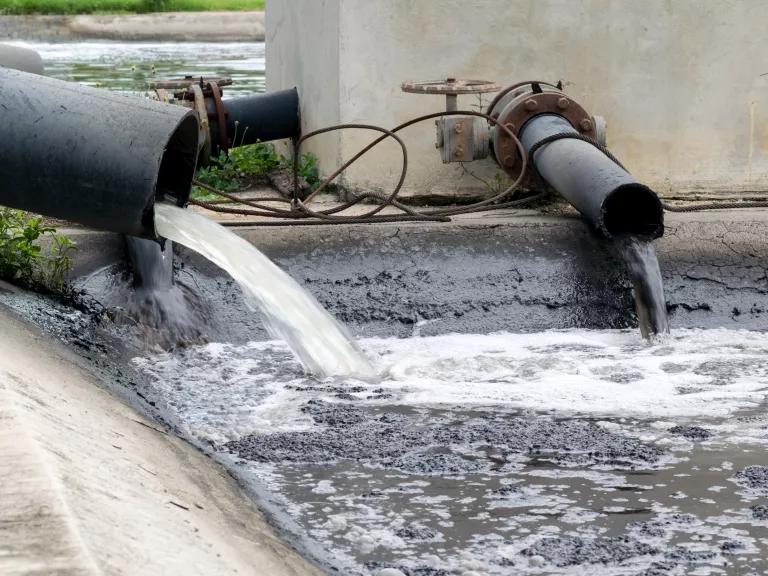North Carolina Environmental Commission Dithers on Necessary Standards
The newest members of the Environmental Management Commission are keeping PFAS pollution flowing to North Carolina's taps.
Last month, North Carolina’s Environmental Management Commission decided to stall proposed regulations that would address PFAS, again. The Environmental Management Commission’s (EMC) inaction in May was the inevitable and desired outcome of legislators’ actions last year. Senate Bill 512, passed by the General Assembly in 2023, transferred two EMC seat appointments from the Governor to the Commissioner of Agriculture. These newest appointments recently halted the state’s first regulatory steps to address PFAS in ground water and surface water and signal the politicization of what should be a nonpartisan Commission.

PFAS are a group of over 15,000 chemicals that have been sickening North Carolinians for decades. The chemicals are nearly indestructible and are toxic at extremely low levels, a potentially deadly combination. Drinking water is a primary source of PFAS exposure, particularly for pregnant and lactating women.
State-level action is desperately needed and long overdue. Because of PFAS pollution, over 8,500 people in North Carolina must use an alternative drinking water source, like bottled water, and hundreds of thousands more are drinking tainted water. The rules currently stalled by the EMC would help reduce the flow of PFAS into the state’s waterways, including its drinking water sources. They would help protect people and the environment from additional PFAS exposure and reduce the cost of cleaning up drinking water overall. That’s because it’s much cheaper to control PFAS via ground and surface water limits than to try to remove these chemicals from drinking water at the treatment plant. It’s also more equitable to stop pollution before it reaches drinking water sources, because polluters pay to clean up their own messes. Instead, right now residents are paying to clean up these polluters’ messes. Senator Lee, state legislative leadership and their allies at the NC Chamber of Commerce seem happy to let North Carolinians foot the hefty economic and health bills.

Protecting North Carolinians from continued exposure to toxic PFAS requires a multi-faceted approach. This approach includes implementing the Environmental Protection Agency’s (EPA) new PFAS limits for drinking water, enacting state-level limits on the dumping of PFAS into waterbodies, and requiring the clean-up of PFAS that have already been released into the environment. DEQ has been slowly but steadily working on the latter two facets, only to have them come to a grinding halt at the EMC. DEQ has proposed groundwater standards for PFAS and presented relevant information at EMC meetings in November, January, March, and May. The Commission has long had enough information but is refusing to act on DEQ’s proposal and release the proposed groundwater standards for public comment. A similar timeline has unfolded for surface water standards for PFAS and the Chamber of Commerce couldn’t be happier. The Commission is supposed to be non-partisan, and is required to “protect, preserve, and enhance” the water resources of the state. However, certain members have recently seemed more worried about protecting polluters’ bottom line.
North Carolina legislative leadership, members like Senator Lee, and the EMC they created are letting North Carolinians drink PFAS and requiring them to subsidize polluters. And people are footing the bill—with their health and the health of their loved ones, and with their pocketbooks. So far, utilities in the state (and ratepayers, AKA residents and small businesses) have spent over $150 million to clean up PFAS in drinking water that has been dumped by a mere few. Unfortunately, that figure is just going to grow. Without an enforceable rule to hold all polluters accountable, not just Chemours, we will not see progress.

Recently-introduced House Bill 864 would allow DEQ’s Secretary Biser to order PFAS manufacturers to pay the costs associated with removing PFAS pollution from some drinking water systems. While this creative bill could help some parts of the state and hold Chemours accountable in certain ways, it would not solve the PFAS pollution problem at the source, allowing polluted water to continue flowing into the lower Cape Fear, and ignores other parts of the state where residents will still be forced to pay for clean-up of corporate polluters’ messes. In short, H864 falls short, and state rulemaking is necessary even if the bill becomes law. If leaders in the legislature were serious about addressing PFAS, they would be fighting for ground water and surface water standards for the entire state.
We need the EMC and North Carolina legislative leadership, including Senator Lee, to remember that they work for North Carolinians, and not a few deep-pocketed polluters. It’s time to set strong surface and ground water standards so we can stop the flow of PFAS pollution from the factories to our taps.



